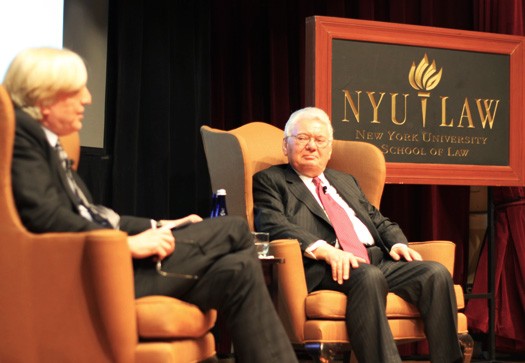Late last year in New York, ICTJ and the Center for Human Rights and Global Justice at NYU School of Law hosted Auschwitz survivor and Judge Thomas Buergenthal for the 7th Annual Emilio Mignone Lecture on Transitional Justice.
The event, held on December 12, 2013 and titled “Reflections on the Landscape of Justice: From Auschwitz to The Hague,” featured Judge Buergenthal in conversation with David Tolbert, President of ICTJ, on the subject of Buergenthal’s remarkable story of survival, resilience, and fierce dedication to international justice.
Watch: Introduction by José Enrique Alvarez, Herbert and Rose Rubin Professor of International Law at New York University School of Law:
Judge Thomas Buergenthal is currently the Lobingier Professor of Comparative Law and Jurisprudence at the George Washington University Law School, and served as an American Judge on the International Court of Justice (ICJ) from 2000 until 2010. Between 1979 and 1991, he was a Judge and President of the Inter-American Court of Human Rights. In the 1990’s, he served as a member of the UN Human Rights Committee and the UN Truth Commission for El Salvador.
In discussion with David Tolbert, Judge Buergenthal reflected on the effectiveness of truth commissions and the future of regional tribunals.
In his opening remarks, Buergenthal explained the inspiration for his memoir, A Lucky Child, which details his experience in the Auschwitz concentration camp, where he was taken at the age of 10. The book also chronicles his life in Germany after the war, and his life in the United States following his arrival in 1951.
When asked why he waited over six decades to write the memoir, Buergenthal responded that it is “a very different book” than if he had written it immediately after his time at Auschwitz.
“I was asked once at the Holocaust Museum to talk about the death march out of Auschwitz, and I suddenly realized that I no longer felt the cold and the hunger of January, 1945, Poland,” he said. “If I had written it right afterwards, not only would I have felt the cold, I would have also felt a tremendous hatred.”
Watch: David Tolbert and Judge Buergenthal in conversation:
A founder of the Inter-American Court for Human Rights, Buergenthal offered his insight on the role of regional mechanisms and his opinion on the role of human rights courts.
“We should have regional human rights courts all over the world,” said Buergenthal. “They create a local commitment and get people used to the idea that there are international tribunals that watch governments… I think it’s critical.”
He emphasized the importance of truth commissions as a complement to the work of courts.
“I’ve often thought that Nuremberg wasn’t enough. Courts can’t really tell the history of a terrible conflict. But truth commissions can describe the history, what went on and the causes in a way that the courts cannot."
When asked to reflect upon his vision for the role of transitional justice, human rights, and education, he pointed to the steps taken by Germany to address their role in the Second World War. “Sixty years ago it was a killer nation,” he said. “But today it is probably the most democratic country in Europe. That was achieved because of education.”
In closing, Tolbert asked Judge Buergenthal to reflect on the example set by the life and work of the late Nelson Mandela.
“It shows what can be done with a commitment to reconciliation after terrible conflicts: Germany is one example, South Africa is another. But then, you see countries that haven’t figured it out yet, and it’s hard to believe why some still haven’t apologized for what they have done. The failure to apologize just breeds more hatred. Mandela taught all of us what reconciliation is all about.”
Watch: Audience Q&A
The event was attended by over 200 people and included distinguished guests such as Emilio Mignone’s granddaughter, Agustina del Carril, as well as Juan Mendez, the President Emeritus of ICTJ.
Below is an excerpt from Buergenthal’s book, A Lucky Child:
Though I do not believe that I survived the Holocaust in order to devote my life to the protection of human rights, I do believe that having survived, I do have an obligation to do all I can to spare others wherever they may be from suffering similar or worse fates. The terrible crimes and cruelties inflicted in other parts of the world since the Holocaust have not weakened my commitment to human rights one jot. Instead they have reinforced my belief to promote human rights education at all levels, and to build an international and national legal and political framework that will make governmental violation of human rights, increasingly difficult.
Photo: Thomas Buergenthal in conversation with ICTJ President David Tolbert. (Rayne B. Holm/ICTJ)
